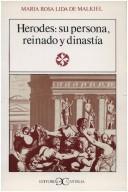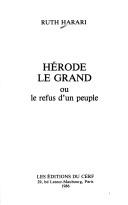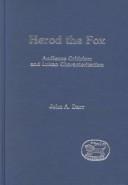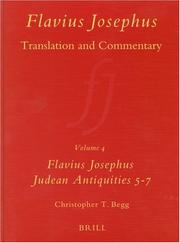| Listing 1 - 10 of 10 |
Sort by
|

ISBN: 9788470392719 8470392719 Year: 1977 Publisher: Madrid: Castalia,
Abstract | Keywords | Export | Availability | Bookmark
 Loading...
Loading...Choose an application
- Reference Manager
- EndNote
- RefWorks (Direct export to RefWorks)
Book
Year: 2001 Publisher: Project Gutenberg
Abstract | Keywords | Export | Availability | Bookmark
 Loading...
Loading...Choose an application
- Reference Manager
- EndNote
- RefWorks (Direct export to RefWorks)
Mariamne --- consort of Herod I --- King of Judea --- approximately 57 B.C.-approximately 29 B.C. --- Drama --- Herod I --- 73 B.C.-4 B.C.
Book
Year: 2001 Publisher: Project Gutenberg
Abstract | Keywords | Export | Availability | Bookmark
 Loading...
Loading...Choose an application
- Reference Manager
- EndNote
- RefWorks (Direct export to RefWorks)
Mariamne --- consort of Herod I --- King of Judea --- approximately 57 B.C.-approximately 29 B.C. --- Drama --- Herod I --- 73 B.C.-4 B.C.

ISBN: 2204024678 9782204024679 Year: 1986 Publisher: Paris Cerf
Abstract | Keywords | Export | Availability | Bookmark
 Loading...
Loading...Choose an application
- Reference Manager
- EndNote
- RefWorks (Direct export to RefWorks)
Ancient history --- Herod I the Great --- Jews --- Kings and rulers --- Biography --- Herod --- Palestine --- Jews - Kings and rulers - Biography --- Herod - I, - King of Judea, - 73 B.C.-4 B.C --- Palestine - Kings and rulers - Biography
Book
ISBN: 9780192845214 0192845217 9780192659835 Year: 2021 Publisher: Oxford, United Kingdom: Oxford University Press,
Abstract | Keywords | Export | Availability | Bookmark
 Loading...
Loading...Choose an application
- Reference Manager
- EndNote
- RefWorks (Direct export to RefWorks)
"Most of our information about Herod the Great derives from the accounts found in Josephus' "Jewish War" and "Jewish Antiquities." Together they constitute quite a unique resource on one of the most famous personalities of ancient history. But whence did Josephus get his information? It is commonly agreed that his primary source was Nicolaus of Damascus, Herod's court historian, though the extent to which Josephus adapted his material remains disputed. This book takes a modern source-critical approach to Josephus' extensive account of Herod's reign to suggest that Josephus did indeed rely heavily on Nicolaus's work, but that previous scholarship was mistaken in seeing Nicolaus as a mere propagandist. Nicolaus may have begun his "Universal History" while Herod was alive, but he finished it after his death. He thus had no reason to write propaganda. This makes his work all the more interesting, for what we have instead is something rather different: a Syrian intellectual claiming a place in Augustan Rome, by telling a story about what the Augustan World looks like on the Eastern periphery. We delineate Nicolaus' approach to various critical topics in Herod's reign in order to reveal the Damascene's perception of client kingship, the impact of empire, and the difficulties involved in ruling Judaea. Most significantly of all, we uncover an Eastern intellectual's view on how to succeed and how to fail in the new Augustan world order"--
Jews --- Herod - I, - King of Judea, - 73 B.C.-4 B.C --- Nicolaus, - of Damascus --- Josephus, Flavius. - De bello Judaico --- Josephus, Flavius. - Antiquitates Judaicae --- Rome --- History --- Historiography --- Herod --- Nicolaus, --- Josephus, Flavius.

ISBN: 1850758832 9781850758839 Year: 1998 Volume: 163 Publisher: Sheffield Sheffield academic press
Abstract | Keywords | Export | Availability | Bookmark
 Loading...
Loading...Choose an application
- Reference Manager
- EndNote
- RefWorks (Direct export to RefWorks)
Herod I the Great --- Bible NT. Gospels. Luke --- Bible NT. Acts of the Apostles --- Herod --- 226.4 --- 226.6 --- Evangelie volgens Lucas --- Handelingen der apostelen. Akten van de apostelen --- Erode, --- Herod, --- Hérode, --- Herodes, --- Heródes, --- Hordos, --- Irod, --- הרוד --- הורדוס --- הורדוס, --- Herod - I, - King of Judea, - 73 B.C.-4 B.C
Book
ISBN: 9782251452562 2251452567 2251916024 9782251916026 Year: 2022 Publisher: Paris : Les Belles Lettres,
Abstract | Keywords | Export | Availability | Bookmark
 Loading...
Loading...Choose an application
- Reference Manager
- EndNote
- RefWorks (Direct export to RefWorks)
La réputation détestable d'Hérode n'est plus à faire : tyran infanticide pour les chrétiens qui l'ont immortalisé dans le massacre des Saints Innocents, roi étranger haï de son peuple d'après la tradition juive, dynaste exotique méprisé par l'opinion selon l'historiographie romaine... L'interférence constante du religieux dans le discours historique a fabriqué une légende noire où se reflète l'ombre monstrueuse des dictateurs modernes. Pourtant, les images stéréotypées qui s'accumulent, cristallisant sur Hérode de multiples représentations collectives, s'imbriquent les unes dans les autres sans jamais convaincre tout à fait. Ce livre entreprend de déconstruire la légende en mobilisant toutes les sources disponibles, en proposant une relecture intertextuelle des documents, en contextualisant les rumeurs dans leur environnement réel et en interprétant les textes à la lumière des données concrètes révélées par l'archéologie. Loin de régner depuis la tanière d'un tyran dans un paysage confus de crime et de châtiment, Hérode se révèle comme un roi qui eut ses partisans à Jérusalem autant que ses adversaires, comme un grand bâtisseur qui modernisa son royaume, comme un pionnier qui fit fleurir le désert de Judée. Son règne inaugura une fusion entre les apports de l'hellénisme, de la Rome impériale et des cultures juive et arabe, dont la continuité est caractéristique du Proche-Orient antique
Hérode Agrippa --- Jews --- Herod - I, - King of Judea, - 73 B.C.-4 B.C --- Classics --- History & Archaeology --- histoire grecque --- histoire des régimes politiques --- histoire de la Grèce antique --- histoire antique --- Proche-Orient ancien --- Kings and rulers --- History --- Herod --- Hérode le Grand

ISBN: 9004117857 9004106790 9004117938 9004117911 9789004169340 9789004263024 9004117865 9789004330610 9789004117914 9789004106796 9789004117853 9789004117860 9789004117938 9004330615 9789004117082 9004117083 9789004513778 9004263020 9004169342 9786612602306 9047442210 1282602306 9789047442219 Year: 2017 Publisher: Leiden Brill
Abstract | Keywords | Export | Availability | Bookmark
 Loading...
Loading...Choose an application
- Reference Manager
- EndNote
- RefWorks (Direct export to RefWorks)
Volume 1b in Brill's Josephus Project contains Book 2 of Josephus' Judean War (translation and commentary). This book deals with a period of enormous consequence: from King Herod's death (4 BCE) to the first phase of the war against Rome (66 CE). It covers: the succession struggle, the governments of Herod's sons, Judea's incorporation as a Roman province, some notable governors (including Pilate), Kings Agrippa I and II, the Judean philosophical schools (featuring the Essenes), various rebel movements and the Sicarii, tensions between Judeans and their neighbors, events leading up to the revolt, the failed intervention of the Syrian legate Cestius Gallus, and preparations for war in Judea and Galilee. The commentary aims at a balance between historical and literary issues.
Jews --- History --- Bible. --- History of Biblical events --- -Geschiedenis van Palestina en het Joodse volk --- -933 Geschiedenis van Palestina en het Joodse volk --- 296*333 --- 296*333 Flavius Josephus:--tekstedities --- Flavius Josephus:--tekstedities --- Apologetics, Jewish --- Jewish apologetics --- Josephus, Flavius. --- Herod Agrippa --- Marcus Julius Agrippa, --- Agrippa --- Agrippa, Marcus Julius, --- Erode Agrippa, --- אגריפס --- הרוד --- Herod --- I --- King of Judea --- 73 B.C.-4 B.C. --- ukslc. --- Annals --- Auxiliary sciences of history --- Kings and rulers. --- Politics and government --- 933 --- Geschiedenis van Palestina en het Joodse volk --- Hebrews --- Israelites --- Jewish people --- Jewry --- Judaic people --- Judaists --- Ethnology --- Religious adherents --- Semites --- Judaism --- -Jews --- 933 Geschiedenis van Palestina en het Joodse volk --- -Hebrews --- -Herod --- Kings and rulers --- Juifs --- Historiography --- Histoire --- Historiographie --- -296*333 --- I&delete& --- King of Judea&delete& --- 73 B.C.-4 B.C --- ukslc --- -Judaism --- 296*334 --- 296*334 Flavius Josephus:--studies --- Flavius Josephus:--studies --- Jews - History - 1200-953 B.C. --- Ouvrages avant 1800. --- -History --- Flavius Josèphe (0038?-0100?)
Book
ISBN: 9780802866059 0802866050 Year: 2015 Publisher: Grand Rapids, Michigan William B. Eerdmans Publishing Company
Abstract | Keywords | Export | Availability | Bookmark
 Loading...
Loading...Choose an application
- Reference Manager
- EndNote
- RefWorks (Direct export to RefWorks)
An old, bloodthirsty tyrant hears from a group of Magi about the birth of the Messiah, king of the Jews. He vengefully sends his soldiers to Bethlehem with orders to kill all of the baby boys in the town in order to preserve his own throne. For most of the Western world, this is Herod the Great -- an icon of cruelty and evil, the epitome of a tyrant.Adam Kolman Marshak portrays Herod the Great quite differently, however, carefully drawing on historical, archaeological, and literary sources. Marshak shows how Herod successfully ruled over his turbulent kingdom by skillfully interacting with his various audiences -- Roman, Hellenistic, and Judaean -- in myriad ways. Herod was indeed a master in political self-presentation.Marshak's fascinating account chronicles how Herod moved from the bankrupt usurper he was at the beginning of his reign to a wealthy and powerful king who founded a dynasty and brought ancient Judaea to its greatest prominence and prosperity.
Jews --- Kings and rulers --- History --- Herod --- 933 <092> --- 933.33 --- Geschiedenis van Palestina en het Joodse volk--Biografieën --- Geschiedenis van het Joodse volk: Romeinse tijd I; Masadah; vernieling van deTempel--(63 v.Chr.-70 n.Chr.) --- Erode, --- Herod, --- Hérode, --- Herodes, --- Heródes, --- Hordos, --- Irod, --- הרוד --- הורדוס --- הורדוס, --- 933.33 Geschiedenis van het Joodse volk: Romeinse tijd I; Masadah; vernieling van deTempel--(63 v.Chr.-70 n.Chr.) --- 933 <092> Geschiedenis van Palestina en het Joodse volk--Biografieën --- Jews - Kings and rulers - Biography. --- Jews - History - 168 B.C.-135 A.D. --- Herod - I, - King of Judea, - 73 B.C.-4 B.C.
Book
ISBN: 9789042924970 9042924977 Year: 2012 Volume: 208 Publisher: Leuven Paris Walpole, MA Leuven Peeters Katholieke Universiteit Leuven. Departement Oosterse Studies
Abstract | Keywords | Export | Availability | Bookmark
 Loading...
Loading...Choose an application
- Reference Manager
- EndNote
- RefWorks (Direct export to RefWorks)
The present study proposes a challenging new chronological framework for the Herodian age, a critical period in Jewish history. Not only do the rules of Herod the Great and his sons receive altered time settings, but the birth and death of Jesus are also placed several years later than is generally accepted. As a consequence of this the dates of Paul's apostolate are reexamined. Ostensibly narrow in scope, these modificationsentail far-reaching implications for our understanding of the Syro-Palestinian region at the beginning of the present era. Interconnections between numerous events are established and tensions within and between the Herodian and Hasmonean dynasties are laid bare. It is shown that Roman impact on the East was substantial, with a strong Hellenistic influence exerted on local cultures. Several customs of the Jewish and early Christian communities, hitherto unknown, are also brought to light.
Jews --- Juifs --- History --- Kings and rulers --- Histoire --- Rois et souverains --- Herod --- Herod Agrippa --- Bible. --- Academic collection --- Erode, --- Herod, --- Hérode, --- Herodes, --- Heródes, --- Hordos, --- Irod, --- הרוד --- הורדוס --- הורדוס, --- Marcus Julius Agrippa, --- Agrippa --- Agrippa, Marcus Julius, --- Erode Agrippa, --- אגריפס --- Ba-yon Tipan --- Bagong Tipan --- Jaji ma Hungi --- Kainē Diathēkē --- New Testament --- Nouveau Testament --- Novo Testamento --- Novum Testamentum --- Novyĭ Zavet --- Novyĭ Zavi︠e︡t Gospoda nashego Īisusa Khrista --- Novyĭ Zavit --- Nuevo Testamento --- Nuovo Testamento --- Nye Testamente --- Perjanjian Baru --- Dhamma sacʻ kyamʻʺ --- Injīl --- Bible --- History of Biblical events --- Herod I --- 568 B.C.-70 A.D. --- Jews - History - 168 B.C.-135 A.D. --- Jews - Kings and rulers - Biography --- Herod - I, - King of Judea, - 73 B.C.-4 B.C. --- Herod Agrippa - I, - King of Judea, - 10 B.C.-44 A.D.
| Listing 1 - 10 of 10 |
Sort by
|

 Search
Search Feedback
Feedback About UniCat
About UniCat  Help
Help News
News